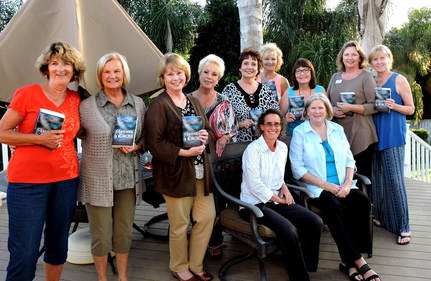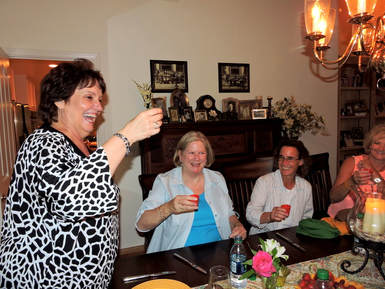Birds of a FeatherWriting is a solitary process, and most writers crave alone time. We treasure those moments when we can dream, muse, think and create. As I set these words on paper, I’m alone, and yet most of my writing involves research, and re-writing. Completing a novel takes a surprising amount on input from a lot of different people. Deborah and I were lucky. To research The Chamber And The Cross, we traveled to England and explored castles, manor houses and historic battlegrounds. On a separate trip, Deborah stayed in several manor houses and interviewed the owners. People opened up their private rooms and attics, the places that guests don’t normally see, so that we could write those details into the book. The firsthand information we gained made the scenes more realistic and believable. Every week, Deborah and I share our work with a group of other writers. We’ve been doing this for years, and after we hear their comments and suggestions, we rewrite, restructure, and polish the scenes again. The input they give us helps us decide what stays in, and what gets cut. We also learn by listening to others read. Chances are, whatever mistakes they’re making are the same ones we’ve made – or are about to make. Whatever stage of the process we’re in, someone else has experienced it too. It’s like being in an exercise group – you have to do your own work, but you can take comfort and inspiration in the fact that others are sweating it out alongside you.  One of the interactions we enjoy most is the connection we share with our readers. Recently we were invited to spend an evening with a special book club, The Finches, for dinner and a discussion of The Chamber And The Cross. The Finches are well-read, well-traveled, and they welcomed into us into their group with open arms. We felt right at home. As we showed slides from our research trips, they were able to see the rooms and gardens that became the settings for our scenes. From drawing rooms to libraries, great halls to medieval kitchens, they could compare what we had described with what they envisioned as they read the book.  And the Finches were full of questions. Who was Oliver, and how did he get into the house? Are we going to tell more of Lorraine’s story in a sequel? How did we decide to structure the book the way we did, with both present and past sections? Yes, there are plans to tell more of Lorraine’s life in a sequel. Oliver was a distant relative; there are clues. And the structure was decided through much trial and error! A discussion like this is more than just Q and A. Talking with readers is an opportunity to learn new things about our book. It’s like going behind the scenes in a manor house – a chance to discover a treasure trove of information. We learned that no detail is too minor. Anglophiles love picturesque descriptions of homes and villages. The Chamber And The Cross is a hefty five hundred pages, but at the end of the book, our readers wanted to know even more. We were able to tell the Finches about some of the characters and relationships that we had pared down, and they told us what they wanted to hear more about when we finally write the sequel. Whatever comes next, one thing is for sure. Just as we incorporate research and critique into each draft, our next book will be shaped by what our readers tell us. They are as much a part of the writing process as pen, paper and laptop. We are delighted to share our words, and to learn from our readers. Thank you, Finches! |
AuthorsBlog site for authors Deborah K. Reed and Lisa K. Shapiro - Co-Authors of The Chamber And The Cross. Archives
February 2016
Categories
All
|
Where to PurchaseSite photography by Deborah K. Reed.
Poetry by Lisa K. Shapiro © 2014 by Deborah K. Reed and Lisa K. Shapiro. All Rights Reseverved. |
|
 RSS Feed
RSS Feed
